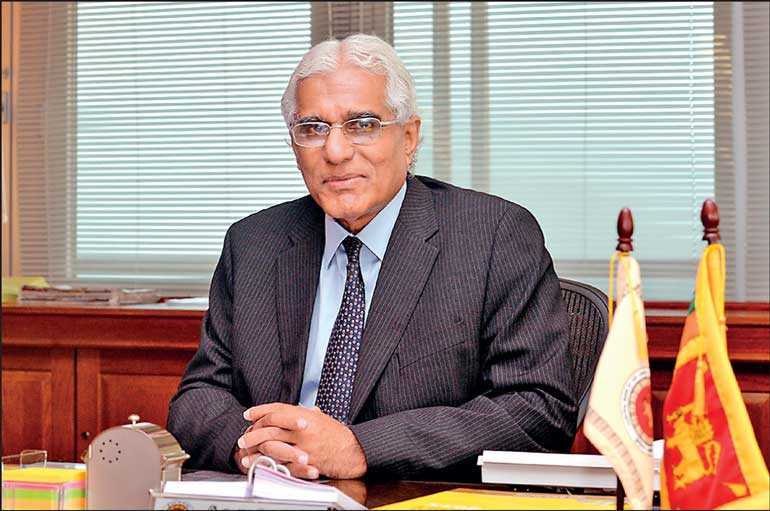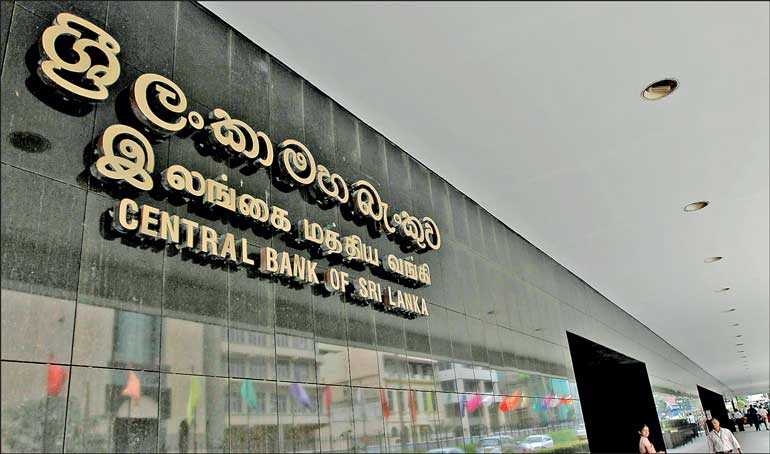Thursday Feb 19, 2026
Thursday Feb 19, 2026
Friday, 11 January 2019 00:00 - - {{hitsCtrl.values.hits}}


Both growth1 and inflation2 have fallen below the targets set by the Central Bank. This failure, however, is going unnoticed due to the constitutional treason that has taken place. The Central Bank has failed on oversight of board appointments to systemically important banks. The Monetary Board has failed to set rates in line with the inflation target.
Setting a low bar
The Central Bank in this regard does not compare itself actively with India. It would not do well. The comparison will increase expectations and bring about a competitive spirit. India has embraced digitisation whereas Sri Lanka has used regulation to stifle any innovation.
Implementing Unified Payments Interface3 and/or Aadhar4 alone could revolutionise access to finance. It has done so in India. Instead, the CBSL chooses to maintain antiquated KYC forms and harass companies like FrMi and Dialog when they try to innovate in this space.
Inflation and growth weightings
The Central Bank had a de facto inflation targeting mechanism in 2018. It will achieve formalisation of this mechanism in early 2019. The CBSL must take balance inflation and growth through policy. Businesses have called for lower interest rates.
Growth over Inflation
Sri Lanka is a poor country. Access to credit is poor. The primary source of income for the lower socio-economic groups is employment. The reason that Mahinda Rajapaksa remains very popular with southern voters is that he was willing to throw caution to the wind and spend. Chinese projects on the whole though macro-economically disastrous are not unpopular. Some projects are highly beneficial to the country.
Four Chinese companies working on major projects as stated by Saman Kelgama5 were able to bring up to 26,000 semi-skilled and unskilled workers to Sri Lanka during the Rajapaksa regime. This was done with little overt resistance. Chinese labour is highly productive according to leadership at Access Engineering6. It also as with the Shangri-La creates lots of desirable jobs for Sri Lankans.
The Governor defends his aversion to inflation by characterising it as highly regressive on the population. This is however not true when it comes to interest rate policy. This is implied in the UNPs call for lower interest rates and Rajapaksa’s lack of concern for high nominal rates. This is because jobs are more important than inflation when it comes to measures of regression. In other words, the negative income effect of inflation is offset by employment opportunities in lower-income households during periods of high growth.
Lower bound for inflation
It is further made worse as the demand for goods and services is only modulated by interest rates. People tend not to borrow to pay for the goods that make up the inflation index. Investment, however, is highly dependent on interest rates. Many would argue that as seen with apartment prices, Sri Lanka is in a deflationary scenario. The Monetary Board must consider broader prices within the economy when setting interest rates.
Debt issuance
The general public remains closed to public and corporate debt markets. Reforms articulated as well back as 2013 in Policy Decisions to develop the Corporate Bond Market7 are yet to be put in place. A few easy reforms from the paper are reproduced below;
“2. Trading Platform
a. Our policy on a trading platform is an order matching, anonymous, screen-based electronic trading platform considering the benefits of reduced transaction costs and time efficiency in executing trades.
10. Central Clearing Corporation
a. Support the view of the necessity on a Clearing Corporation to mitigate counter-party risks.”
The SEC and Stock Exchange have made little progress on this front. Debt issuances both government and corporate have highly illiquid secondary markets. Small players are restricted from accessing the market.
Banking regulation
During the attempted coup, board appointments were made at the Bank of Ceylon8. Switching around management on political whims and doing so with minimal documentation is not in the interests of banking stability. Regulation preventing the sudden reconstituting of the board of systemically important banks is called for. Reasons for changes in the board must be made public and go through considerable scrutiny by the regulator. At the very least people with experience in banking should be considered as being suitable. Appointment of board members should be taken out of the respective line ministry and given to a public commission.
The CBSL has categorically stated that it would not extend credit to a reckless treasury. Such statements are not consistent with the lack of oversight on board appointments. The governor has previously mentioned that the subsidy on fuel and electricity is financed through the balance sheet of the state banks. His use of the word subsidy in this regard is questionable.
A welfare-oriented state looks to improve the plight of people at the lower end of the income spectrum financed by placing taxes on those at the higher end. Subsidy on fuel benefits people who burn fuel. The rich burn exponentially more fuel than the poor. The subsidy benefits the rich. Electricity costs in Sri Lanka are high. This is quite blatantly due to questionable power purchase agreements that the CEB signs on our behalf. Financing provided through the State banks allows for the avoidance of Parliament and is an affront to our democracy.
The State owns most financial institutions in the country (by asset base). Lending is politicised and highly concentrated. There exists significant SOE debt that will have to be written off or absorbed by the treasury. Massive systemic risk is caused by the non-prudent actions of all State-owned financial institutions. The CBSL should look to fix this if it is considered with stability. Instead, the CBSL focuses on the NBFI sector which in terms of the asset base is insignificant to the whole system.
Financial sector consolidation
In many instances, the actions of the Central Bank can be attributed to incompetence. In this area,though the actions of the Central Bank are blatantly corrupt. No notable consolidation has taken place in the period of 2018. Companies with shared ownership and multiple finance licenses have not been pressured to merge. No state-owned institution with a similar license holding structure has been pressured to merge.
The Central Bank has instead imposed capital requirements that are not proportionate to an institutions’ lending portfolio. The directive on 23 February9 exists to force smaller market players to initially be put into difficulty and then forced into a merger. The capital market remains depressed making such hostile acquisitions highly profitable. This, when taken with the scale of the NBFI system, leads one to believe that the intentions of the CBSL are not financial market stability.
Ownership structures contrary to recent statements10 have become more concentrated under CBSL policy. LOLC has seen the exiting of the Orix Corporation. New entrants into the NBFI sector have questionable sources of funds and show no track record in the business. Promoters of microfinance who have partaken in the most unscrupulous lending practices will benefit through mergers with less risky loan books.
The CBSL should in line with the Right to Information proactively disclose what it aims to achieve with its actions with financial sector consolidation. Such a simple hurdle, though usually ignored by the CBSL11, should be one that precedes any policy in a democracy. Soft pushes and massive incentives to consolidation might be more effective.
Setting a precedent
The Governor continuously talks about how a Central Banker is expected to resign if they fail to achieve pre-set objectives. Additionally, resignation at this point would be counterproductive. Instead, the CBSL should push through on its current plans. Simple tweaks and openness would help clear allegations of criminality with regard to the financial sector consolidation plan.
The Governor in his public persona recalls his most embarrassing moment as that of being out for a duck during his school days12. Though this may just be a conversational piece which quite deftly brings out his enviable education and athletic achievements it may need some rethinking. Will he fail to hit targets in 2019?
Footnotes
1 http://www.lankabusinessonline.com/sri-lanka-gdp-2-9-pct-for-the-third-quarter-2018/
2 https://www.cbsl.gov.lk/sites/default/files/cbslweb_documents/press/pr/press_20181121_Inflation_in_October_2018_e.pdf
3 https://www.npci.org.in/product-overview/upi-product-overview
4 https://uidai.gov.in/
5 Title: China-Sri Lanka Economic Relations: An Overview, Journal: China Report Volume: 50 Issues: 2 131—149Author(s): Kelegama, S., Publisher: Sage Publications, Year: 2014
6 CSE CSBA presentation- https://www.youtube.com/watch?v=vvCIdh6q8x4
7 http://www.sec.gov.lk/wp-content/uploads/consultation-paper-v3..pdf
8 https://www.cbsl.gov.lk/sites/default/files/cbslweb_documents/laws/cdg/Finance_Business_Act_Directions_No_2_of_2017_e.pdf
9 http://www.ft.lk/financial-services/NBFIs-operate-according-to-shadow-directors--mandate--Regulator/42-668878
10 https://cdn.cse.lk/cmt/uploadAnnounceFiles/7661543385113_861.pdf
11 http://www.dailymirror.lk/article/Central-Bank-ordered-to-release-EPF-data-159248.html
12 http://life.dailymirror.lk/article/fashion/indrajit-coomaraswamy/54/11408